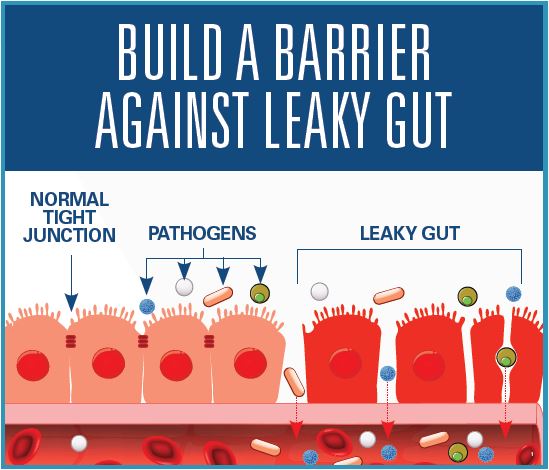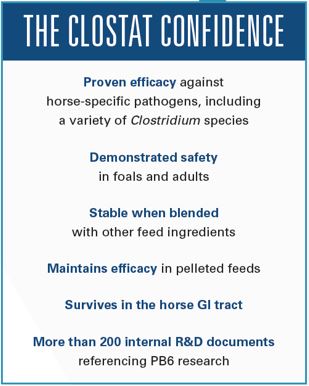You are viewing United States
- United States
- Canada
- Mexico
- South America
- EMENA
- Sub-Saharan Africa
- Russia
- South Asia
- Asia Pacific
- China
- Global
Choose Your Location:
- United States
- Canada
- Mexico
Popular Searches
- Animal Nutrition & Health
- CLOSTAT®
- CLOSTAT® for Equine
CLOSTAT®
CLOSTAT® contains PB6, a proprietary strain of Bacillus subtilis. PB6 is a probiotic that helps improve intestinal health and integrity. It does this by maintaining a healthy balance of microflora in the gut and by helping develop a natural defense against harmful bacterial pathogens.
Why Feed CLOSTAT?
The lining of the gut not only absorbs nutrients, it also provides a barrier against pathogens, parasites and toxins. PB6 secretes an active substance which helps maintain the balance of microflora in the gut. When balanced, good bacteria help keep pathogenic bacteria under control.1 When unbalanced, pathogens can multiply and damage the gut lining, resulting in Leaky Gut Syndrome (LGS). Harmful substances can then cross the barrier and infect the horse. By supporting the microbial balance in the intestinal tract of your horse, CLOSTAT® can help improve gut health, which can mean less LGS and improved athletic performance and overall wellbeing.
Kemin has more than 200 R&D documents referencing PB6 trial work that indicates that PB6:
- Has a proven mode of action in its inhibition of equine-specific pathogens including a variety of Clostridium species.2
- Is proven to survive in the horse's GI tract.3
- Maintains efficiency when pelleted.3
- Has demonstrated safety in foals and adult horses.4,5

Watch the video below to learn how CLOSTAT can help improve the health and overall wellbeing in an array of animals – including your horse.
The intestinal barrier is regularly exposed to up to 10 trillion microorganisms,6 making it extremely important to keep it functioning properly. Maintain a health microbial balance and develop a natural defense against harmful bacterial pathogens with CLOSTAT. Learn more:
Product Specifications
%20-%20English_10.pdf/_jcr_content/renditions/cq5dam.thumbnail.319.319.png)
Resources
References
1Durairaj, V., & Clark, D. (n.d.). Necrotic Enteritis. Retrieved September 4, 2018, from http://www.thepoultrysite.com/articles/846/necrotic-enteritis/.
2Burke, M. L., & Moore, S. A. (2017). Bacillus subtilis Strain PB6 Demonstrates Growth Inhibition Toward Equine-Specific Bacterial Pathogens. Journal of Equine Veterinary Science, 58, 84-88. doi:10.1016/j. jevs.2017.08.016.
3The Role of Commercial Pelleting on the Viability of Bacillus subtilis Strain PB6, TL-16-00045.
4Safety of Bacillus subtilis Strain PB6 In Mature Horses Following Oral, BB-08-00025.
5Safety of Bacillus subtilis Strain PB6 In Neonatal Foals Following Oral Administration, BB-08-00021.
6Vighi, G., Marcucci, F., Sensi, L., Cara, G. D., & Frati, F. (2008). Allergy and the gastrointestinal system. Clinical & Experimental Immunology, 153, 3-6. doi:10.1111/j.1365-2249.2008.03713.x.
Have a Question?
If you have a question about our products or services, or just want more information, fill out the form below and someone on our team will be in contact with you.
Products
Careers
Careers
- California Residents
- California Supply Chain Act
- Canada Forced Labor and Child Labor Report
- Email Disclaimer
- GDPR Personal Data Addendum
- General Terms & Conditions for Vendors
- Global Environmental Policy Statement
- Indirect Cost Estimates
- Kemin Terms & Conditions
- Modern Slavery Act Transparency Statement
- Privacy Policy
- Sitemap
- Change Cookie Consent
© Kemin Industries, Inc. and its group of companies All rights reserved. ® ™ Trademarks of Kemin Industries, Inc., USA
Certain statements may not be applicable in all geographical regions. Product labeling and associated claims may differ based upon government requirements.
You are viewing United States
- United States
- Canada
- Mexico
- South America
- EMENA
- Sub-Saharan Africa
- Russia
- South Asia
- Asia Pacific
- China
- Global
Choose Your Location:
- United States
- Canada
- Mexico




